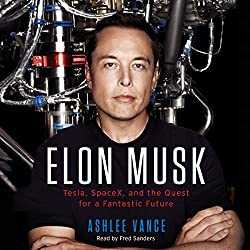
What is the most important problem in my field and why am I not working on it?
~ Richard Hamming
A few months ago, I finished Tim O'Reilly's WTF – What is The Future and Why It's Up to Us.


WTF is amazing. You read it, and for the next couple of weeks, you're recommending it to everyone you see. Oh, you had so and so idea? WELL LET ME TELL YA, this Tim O'Reilly fellow wrote about it in his book and ho boy did he ever break it down and analyze the crap out of it.
You should read it.
It revolves around 10 or so interesting ideas and thinks through them in great detail. The idea that stuck with me the most was about Uber and Lyft and that whole ecosystem.
O'Reilly argues the innovation there wasn't improving taxi companies. The real innovations was making it feel like everyone has a personal driver. You press a button and a car shows up. You get in. You get out. No paying, no figuring out best routes, no worrying about explaining where to get picked up and dropped off.
That is so true. The exact thing I love about ridesharing is that it's not like a taxi. All the annoying parts are gone.
Then he goes on to talk about how we are augmenting humans with technology and limited AI and how the future is AI assisting humans. That was interesting, too.
Fundamentally, O'Reilly's WTF book got me thinking about big, world changing ideas. Why aren't I working on those?
For the past few weeks (yes, I'm slow), I've been reading Elon Musk's biography.


The book about Ol' Musky is… inspirational?
Here's a guy with a killer life story, putting rockets into space and batteries into cars. Silicon Valley's darling who once was the butt of every joke about rich guys and wishful thinking.
His story didn't teach me much because I don't want to be a blowhard who cycles through employee after employee because they all burn out.
But reading about Elon Musk did make me self-conscious. Here's a guy with a grand unifying vision of the future, working hard to get there. First, he took on the banks, then he took on the banks in a different way, then he realized humanity is doomed and got to work saving it.
Why don't I have a grand unifying vision like that? What's my big fucking idea? (he likes to drop f-bombs, book's full of 'em)
🤔🤔
Just before Christmas, I had coffee with the founder of my day job startup. We talked about my sidehustle and how that's going and that it's growing and what to do about it.
As he was about to race off to his next meeting, he said something like "Swiz, you're a great guy, and I support that you have a sidehustle, but come on man, that's some low-conviction bullshit. You're better than that.”
That stung.
He's right though. It is low conviction. It's important to share knowledge, and the Thank You emails I get definitely say my work is important and helpful.
But is helping people improve their craft going to change the world? Maybe. Is it a big risky swing for the fences kind of bet? Nah.
Way back when I was a wee lad of 21, my ideas were far grander, and I was ready to take on the world. Now I'm like, How do I build a business that makes a few hundred thousand per year, maybe a million?
sigh
Yesterday, I read a paraphrased quote from Richard Hamming's essay You and Your Research:
You have to ask yourself: What is the most important problem in my field and why am I not working on it?
~ Richard Hamming
And that was the last nail in the coffin. I legit don't know what to do with myself.
My work is important, but is it important enough?
Continue reading about Am I thinking too small?
Semantically similar articles hand-picked by GPT-4
- Do important work
- The entrepreneur's curse
- Why I still haven't learned Haskell
- Deep work December
- How to take ownership and make progress without explicit direction
Learned something new?
Read more Software Engineering Lessons from Production
I write articles with real insight into the career and skills of a modern software engineer. "Raw and honest from the heart!" as one reader described them. Fueled by lessons learned over 20 years of building production code for side-projects, small businesses, and hyper growth startups. Both successful and not.
Subscribe below 👇
Software Engineering Lessons from Production
Join Swizec's Newsletter and get insightful emails 💌 on mindsets, tactics, and technical skills for your career. Real lessons from building production software. No bullshit.
"Man, love your simple writing! Yours is the only newsletter I open and only blog that I give a fuck to read & scroll till the end. And wow always take away lessons with me. Inspiring! And very relatable. 👌"
Have a burning question that you think I can answer? Hit me up on twitter and I'll do my best.
Who am I and who do I help? I'm Swizec Teller and I turn coders into engineers with "Raw and honest from the heart!" writing. No bullshit. Real insights into the career and skills of a modern software engineer.
Want to become a true senior engineer? Take ownership, have autonomy, and be a force multiplier on your team. The Senior Engineer Mindset ebook can help 👉 swizec.com/senior-mindset. These are the shifts in mindset that unlocked my career.
Curious about Serverless and the modern backend? Check out Serverless Handbook, for frontend engineers 👉 ServerlessHandbook.dev
Want to Stop copy pasting D3 examples and create data visualizations of your own? Learn how to build scalable dataviz React components your whole team can understand with React for Data Visualization
Want to get my best emails on JavaScript, React, Serverless, Fullstack Web, or Indie Hacking? Check out swizec.com/collections
Did someone amazing share this letter with you? Wonderful! You can sign up for my weekly letters for software engineers on their path to greatness, here: swizec.com/blog
Want to brush up on your modern JavaScript syntax? Check out my interactive cheatsheet: es6cheatsheet.com
By the way, just in case no one has told you it yet today: I love and appreciate you for who you are ❤️

